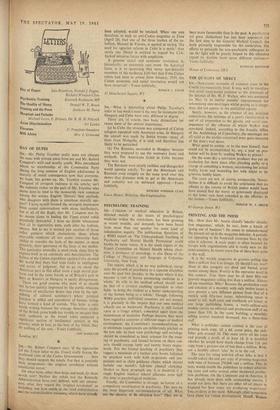THE QUALITY OF MERCY Sig.—Nee,sptiper accounts of-criminal cases in the
Courts are necessarily brief. It may well be therefore that some exceptional evidence to the detriment of the defence of Mr. W. F. Walker, who was sentenced on May 11 to twelve months' imprisonment for solemnising nine marriages whilst posing as a clergy- man, did not appear in the published reports Surely, however, in the absence of an previous convictions, the sentence of a year's incarceration is out of all proportion to the gravity and social con- sequences of the offences of which Walker was convicted. Indeed, according to the Faculty Office of the Archbishop of Canterbury, the marriages are all valid as the parties concerned were quite innocent of the man's real status.
What good to society, or to the man himself, that could not be accomplished by, say, a year on pro- bation will be done by sending Walker to prison?
On the same day a television producer was put on probation for three years after pleading guilty to a charge of assaulting a woman, occasioning her actual bodily harm and wounding her with intent to do grievous bodily harm.
The cases arc not, of course, comparable. Never- theless it is difficult to avoid the conclusion that no offenee to the canons of British justice would have been caused had the mercy so generously displayed in the latter case been extended to the offender in the former.—Yours faithfully,






































 Previous page
Previous page